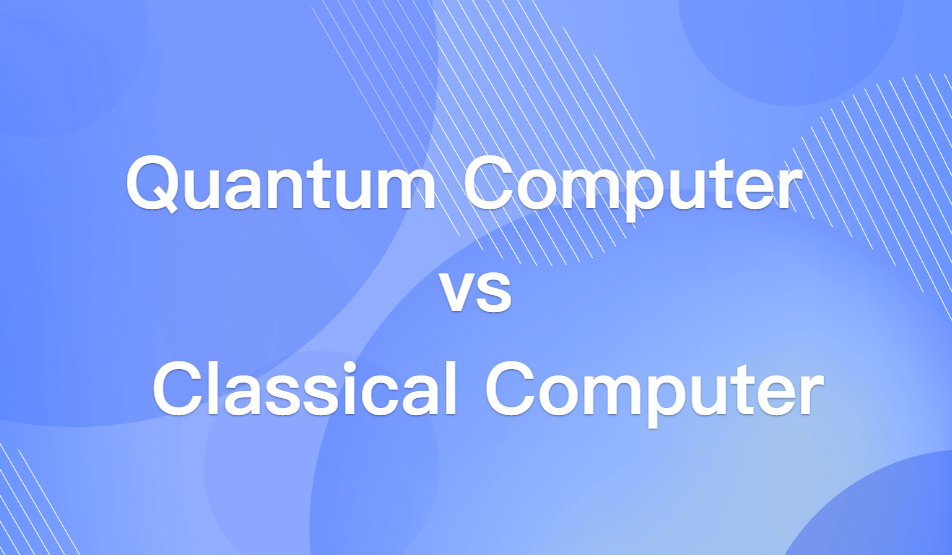Quantum Computer vs Classical Computer
Before diving into the topic, imagine this scenario: You're standing in front of a super-library containing every book ever written. Your task is to find one specific sentence on a single page—but you have no index, no table of contents, and no clues about where it might be. The only option? Open books one by one until you stumble upon it. This brute-force, sequential approach mirrors how classical computers tackle certain complex problems. That’s precisely why quantum computers can vastly outperform classical computers when solving specific types of complex challenges.

Classical Computers: Built on Bits
The devices we use daily—laptops, smartphones, servers—are all powered by classical computers. At their core, they process information using bits (binary digits).
A bit is like a tiny switch with only two definite states: 0 (off) or 1 (on). Every piece of digital content you interact with—text, images, videos—is ultimately broken down inside the computer into long strings of 0s and 1s (e.g., 01001101...). Think of it like a string of light bulbs: each bulb is either on or off, and the pattern encodes information. In reality, of course, the system is far more intricate—but the principle remains binary and deterministic.
This reliance on definite, stable states makes classical computers incredibly reliable for everyday tasks—but it also imposes fundamental limits on their computational power for certain problems.
Quantum Computers: Powered by Qubits
Quantum computers operate on an entirely different foundation: quantum mechanics, the physics governing the subatomic world. Their basic unit of information is the quantum bit, or qubit.
Unlike classical bits, qubits aren’t confined to just 0 or 1. Thanks to quantum phenomena, they unlock extraordinary capabilities:
Key Difference: How Information Is Processed
-
Classical Computer: Processes information sequentially.
For example, two classical bits can represent only one of four possible states at any given time: 00, 01, 10, or 11. -
Quantum Computer: Leverages quantum superposition to process information in parallel.
A single qubit can exist in a combination of 0 and 1 simultaneously. With N qubits, a quantum computer can theoretically represent 2^N states at once.
→ Two qubits = 4 states (00, 01, 10, 11) simultaneously.
→ Fifty qubits = over 1 quadrillion (10^15) states in parallel!
This exponential parallelism enables quantum computers to explore vast solution spaces instantly—making them uniquely powerful for specific computational challenges.
What Problems Do They Solve Best?
Classical Computers Excel At:
- Deterministic, logic-driven, sequential tasks
- Everyday applications: word processing, web browsing, video streaming
- Running operating systems and conventional software
- Precise arithmetic and graphics rendering
- Most current AI inference and training workloads
They remain the backbone of modern computing across business, science, and personal use.
Quantum Computers Show Promise For:
- Optimization Problems: Finding the best solution among countless possibilities—e.g., global logistics routing, financial portfolio optimization.
- Unstructured Search: Rapidly locating an item in a massive, unsorted database (via Grover’s algorithm).
- Cryptography: Certain quantum algorithms (like Shor’s algorithm) could theoretically break widely used public-key encryption (e.g., RSA), driving urgent research into quantum-safe cryptography and quantum key distribution (QKD).
Stability & Practical Challenges
-
Classical Computers: Highly stable. Bits are robust against environmental noise and operate reliably at room temperature.
-
Quantum Computers: Extremely fragile. Qubits rely on delicate quantum coherence—a state easily destroyed by heat, vibration, or electromagnetic interference (a process called decoherence). To preserve superposition, quantum processors must operate near absolute zero (–273°C) in heavily shielded environments. Even then, advanced quantum error correction techniques are essential to maintain computational accuracy. This fragility remains one of the biggest barriers to practical, large-scale quantum computing today.
Will Quantum Computers Replace Classical Computers?
Not anytime soon—and likely never completely. Instead, think of them as powerful collaborators.
In the foreseeable future, you’ll still use your classical laptop or phone for everyday tasks like email, video calls, and document editing. But when faced with an intractable scientific simulation, complex molecular modeling, or a massive optimization problem, you might send that job to a cloud-based quantum processor—which computes the result and sends it back to your classical device.
This hybrid model—classical + quantum—is where the real synergy lies.
Want to Try a Real Quantum Computer? You Can—Right Now
Yes, really. Companies like IBM, Rigetti, and Origin Quantum offer free cloud access to actual quantum hardware. For example, Origin Quantum’s “Wukong” quantum processor is live on their cloud platform. New users get $180 in free credits (about 1,200 RMB) to run real quantum circuits—no lab coat or physics degree needed. Curious? Give it a spin here—you might just run your first quantum algorithm before lunch.